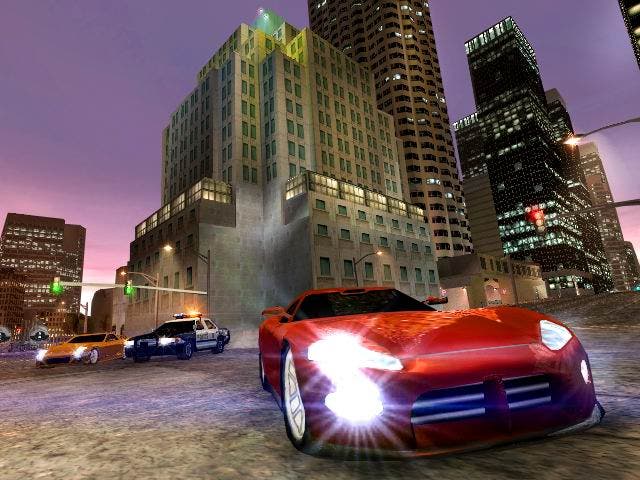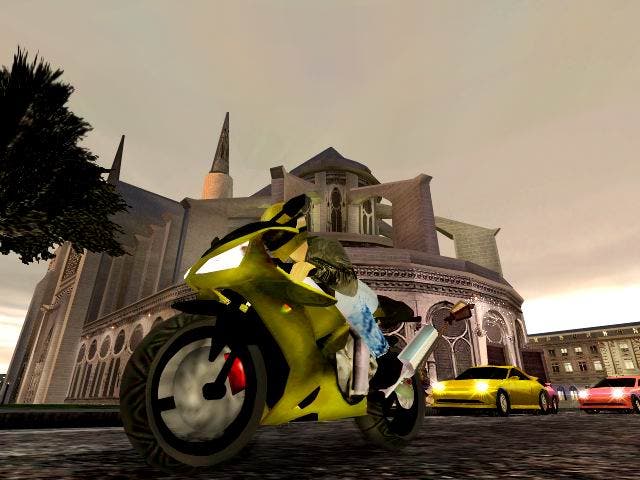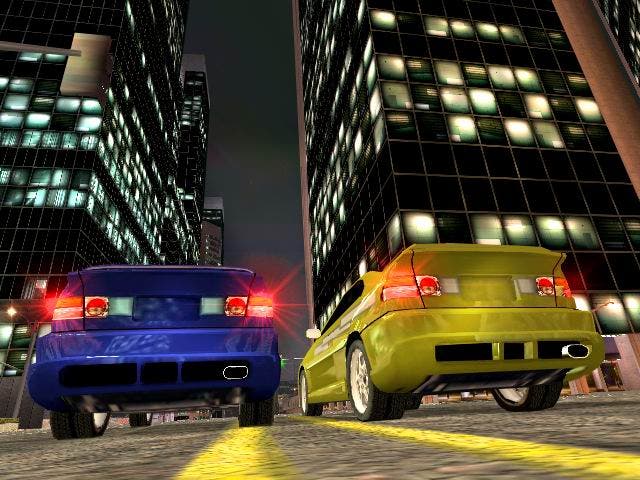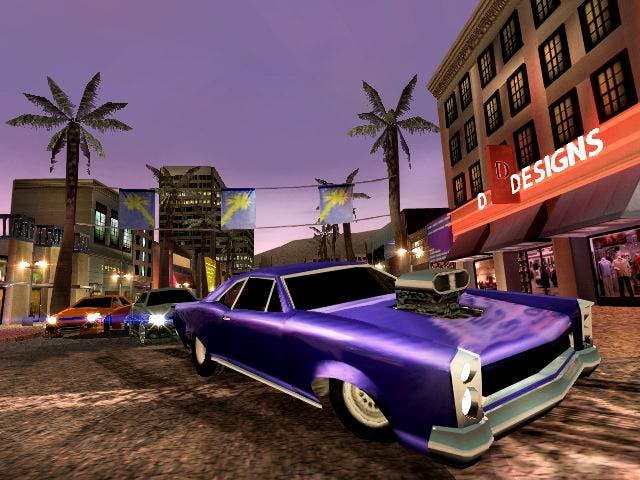Midnight Club II
Xbox joins the club.
Midnight Club II is one of the fastest, most challenging and most addictive arcade racing games ever to appear on the PS2, with an extensive single player campaign backed up by a simple, but satisfying online mode. But as superb as the PS2 version undoubtedly was it harboured a few niggling elements that we were hoping the Xbox port would address; namely a lack of online voice comms (grrr), no online rankings, and visuals that were slightly rough around the edges.
Knowledge is power

In terms of the gameplay features, the Xbox version is functionally identical; Career mode is the main meat of the game where you'll have to win a series of street based races in order to unlock progressively more powerful cars and bikes, Cruise allows you to familiarise yourself with each city, while Circuit Races is a more traditional Arcade flavour of lap based racing. Each set of races take place in a rough approximation of well known real life cities, with Los Angeles the home to the first set, followed by Paris, before climaxing in Tokyo.
In common with Rockstar's GTA series, intimate knowledge of each city is the key to success, with a multitude of underground and rooftop shortcuts available to the curious. The downside of these intricate cities is that it will take you ages before you're really able to take advantage of the 'knowledge', but once you do, it's an enjoyable and rewarding experience.
Most races consist of heading for a series of checkpoints, some linear, some not, against a posse of predictably aggressive and cocksure street racers. In return for winning races, you either end up bagging a special move or their car/bike, which are just rewards for having to put up with their increasingly tiresome jibes about your lack of racing prowess. The numerous special moves help Midnight Club II distinguish itself from the pack, with in-air controls helping you transfer weight during enormous jumps, burnout allowing you to make a quick start, turbo letting you boost, two-wheel drive allowing you to squeeze though tight gaps, and slipstream turbo, as the name suggests, letting you draft past opponents at high velocity.
Stretchy AI

The early races are a fairly straightforward introduction to the business of illegal street racing, but very quickly you hit an almost vertical learning curve, and it's not uncommon to find yourself having to repeat races upwards of ten or more attempts before you get lucky enough to win them.
Part of the problem is the AI. In some senses, the loose AI makes for a consistently enjoyable experience in that the leading pack rarely get so far ahead, and this system allows you to make dramatic comebacks, often stealing first place at the death. On the other hand, when you're doing exceptionally well, the CPU does too, so you'll often also get pipped at the post if you happen to make a mistake late on, despite perhaps achieving your best time by some margin. It's in no way realistic, but at least the game doesn't require you to make repeated restarts - there's always the sense that you can turn things around even if you happen to get off to a bad start.
Perhaps the most annoying aspect of the entire package is that the entire single and multiplayer game is locked up tight until you achieve success in the Career mode. If you're considering purchasing Midnight Club II for some fast and frantic online thrills, bear in mind that by default you'll only have the very worst car available to you, along with only one of the three cities - Los Angeles. Although you will be able to check out the five different LA tracks, as well as the Detonate and CTF Battle modes, in order to get any real enjoyment out of this potentially excellent mode you're effectively forced to commit at least ten hours to the single player game, and it's hard to imagine why the designers thought this was a good idea.
Locked up inside

Although we appreciate that Rockstar wanted to ensure gamers played the single player mode thoroughly, and got rewards for doing do, all it ends up doing is arbitrarily reducing the incentive to play online, and may explain why so few people are currently playing this online, and why so many are playing Midtown Madness 3, which does the opposite.
In MC2, the usual Quickmatch and Optimatch options are available for you to customise what mode you want to go for, but it's not all it could or should be. The interface, first of all, is as rudimentary as we've seen in a console online title, although setting up is nevertheless very quick and easy. Hosting our own session, however, proved utterly futile as there only seemed to be about 40 people in total actually playing across the entire world, and unless we dumbed down our settings to include lesser vehicles and base the race in Los Angeles no-one could join even if they wanted to.
Around a dozen or so matches were occurring in total, but were mainly CTF or Detonate matches, so our hopes of racing were limited to joining one of the very basic LA tracks. We hope the situation improves, because the potential is there for Midnight Club II to be an essential online game, but we suspect it might take a while before enough people have unlocked all the best bits before we see the servers filling up. If we ever do.
Be patient, young man

If you're of the patient persuasion, then there's plenty of fun to be had with online multiplayer once you've committed every ounce of iron will and resolve to the cause of the enjoyable, but taxing single player game. Unlike the PS2 version, you can actually chat to your fellow racers (up to a maximum of eight) before, during and after a race, complete with the fantastically annoying voice masking (which very few people ever use, mercifully). Unfortunately though, once you've chosen your vehicle, there's no way of changing it unless you quit out of the race, potentially losing your place in the session.
As fast and frantic as the PS2 original was, it was easy to see that Rockstar had to make several compromises to keep the game's frame rate solid, and compared to Burnout 2, for example, the visuals just weren't in the same league. The Xbox version is still nowhere near benchmark level, but it's easy to appreciate the improvements, with a higher resolution, better particle effects and superior texturing contributing to a much cleaner looking game. The scenery, in particular, is noticeably less 'foggy' making the game quite a bit easier to play in some of the more frantic areas, as you've got an appreciably greater amount of time to react to your surroundings. Previously we'd continually crash into walls in the darker areas while we attempted shortcuts, but the Xbox version solves all that. Mercy.
On the other hand, as the air is no longer filled with the sound of our crumpling metal death, we're left wondering why Rockstar hasn't taken advantage of the Xbox hard disk and included custom soundtracks, as the selection of tunes we can now hear gets immensely annoying at times.
Final straight
Midnight Club II is undoubtedly a fine game, and is the better of the two versions by virtue of a smattering of extras. But unlike the PS2, Xbox owners have already got a fair selection of top notch online racing games to choose from and many will prefer Midtown Madness 3's approach - particularly as it has been designed from the ground up for the Xbox. Regardless, Midnight Club II is a decent port and has enough going for it in its own right to be considered a worthy purchase, just maybe not an essential one.

